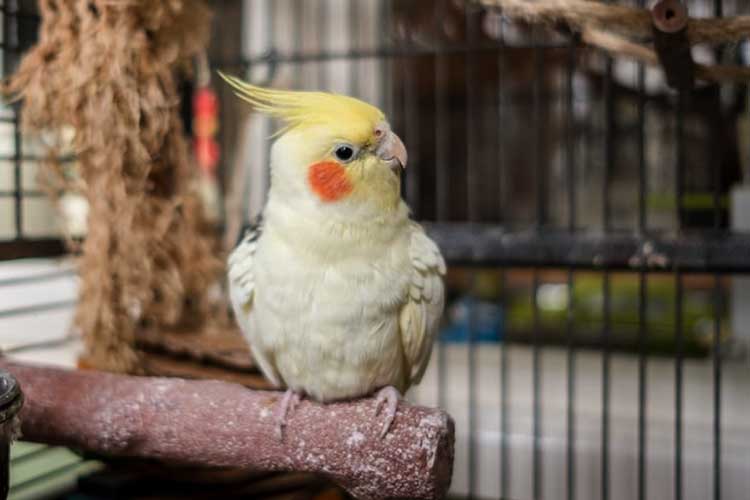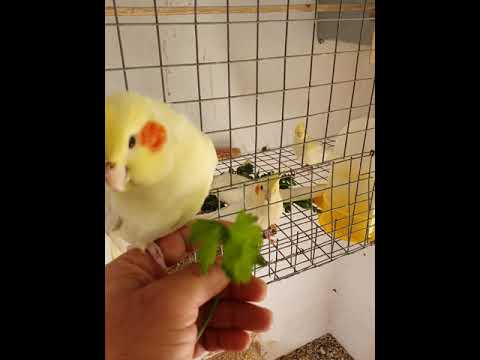The cockatiel is a beautiful species of parrot that is omnivorous in its diet. That means it eats both meat and vegetables. And here it brings up the question as to which vegetables are suitable and which are not.
Can cockatiels eat celery? Yes, they can eat celery, but only occasionally. It’s mostly water and doesn’t add high nutritional value. And cockatiels have only so much space in them to waste it on low nutrition food. So, don’t make it a regular diet.
Here are some tips for feeding this celery to your loving cockatiel, including other relatable information in the article. Let’s start.
Can You Feed Celery To Cockatiels?
You may safely feed celery to the cockatiels since it is not harmful, but you should purchase organically. Because when you are providing something organic, it’s good for the cockatiels’ digestion. In addition, for your bird to have a healthy diet, you should feed celery occasionally as a snack item rather than daily.
As you know, celery is a unique type of vegetable. It does not have seeds, nor does it have a green leafy appearance. Instead, the celery stalk is lengthy, mostly watery and fibrous. If you give your cockatiel an excessive amount of celery, it may even cause stomach problems! Because of that, the clean-up can be “watery,” and nobody will enjoy that.
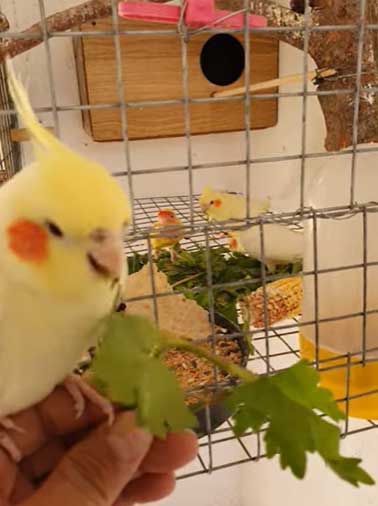
In addition, ensure that you give the celery a complete wash before providing it to cockatiels. It will eliminate any unwanted chemicals or pesticides that may be present on the vegetable. Because it is non-toxic, feeding your bird celery will not hurt it in any way while you are doing so. However, it ought to be fed in moderation and within the reasonable bounds of reason.
To get the most out of the flavor of celery, it should be chopped finely. If you buy this from the market, then you better remove the leaves. Either double wash the celery leaves before including them since they contain the most pesticides. But for more hygiene reasons, we recommend not putting celery leaves in the diet.
Remember that the stringy fibers should be removed. Otherwise, it will be hard to swallow for your bird. Doing all these things will allow you to get the most out of the celery.
It is perfectly OK to feed your bird celery, but you should never make it the bird’s major source of nutrition. Instead, it should be fed as a supplement that is sometimes added to a meal consisting of pellets for the most part.
Do Cockatiels Like Celery?
If you make a list of the favorite foods of cockatiels, celery might not be on it. That is because cockatiels love to eat seeds, tropical fruits, pellets, and other veggies.
Sometimes, they eat insects for their meat protein. So, while hungry, they will consume it willingly, but if there are seeds and pellets available, cockatiels will not even give a look at the celery.
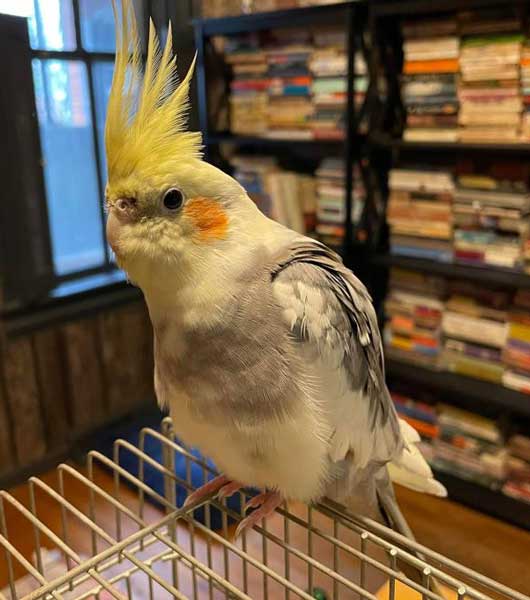
Besides, celery is a stalk vegetable containing fibers and around 95% of water. So, now and then, if you feed this to them, they may have it, but not daily. Moreover, in terms of nutrition, it’s very low.
Health Benefits For Cockatiels Eating Celery
Although celery may not include as many minerals and vitamins as some other plants, it contains vitamin A, which is beneficial for the overall health of your cockatiel. Moreover, it also improves the quality of its feathers.
Additionally, it has folate, potassium, vitamin C, and vitamin K in its composition. These things may stop the cockatiel from picking at its feathers, make it easier for the blood to clot, and keep the metabolism running smoothly.
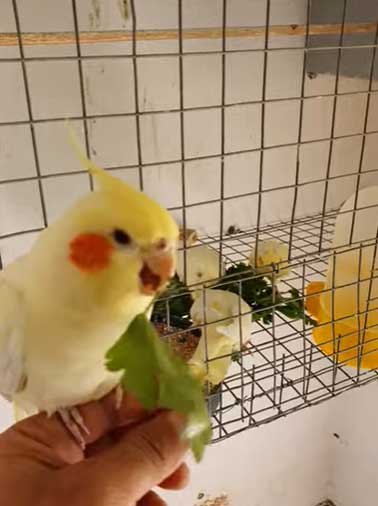
So, as a good source of Vitamins (A, C, and K) including other nutrition Celery is well-balanced food for cockatiels.
How Much Celery Should Cockatiels Eat?
As we mentioned before, cockatiels should eat celery moderately. But how much? After cleaning and removing the leaves from the celery stalk, we suggest giving your cockatiels no more than two to three centimeters of the celery stick as a snack. That should be plenty for your bird.
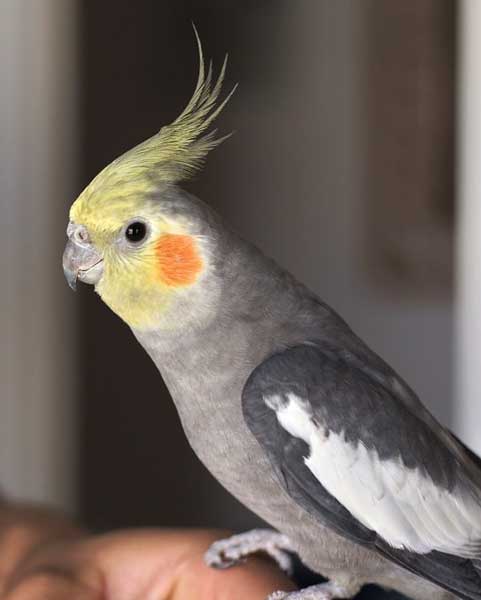
If you give them more than this, you run the danger of taking up space that might be used for other vital meals, such as the pellets that should make up the bulk of their diet.
How Do You Prepare Celery For Cockatiels?
You should not feed celery directly to your cockatiels. It must be prepared for the cockatiels to be eaten. So, how to prepare?
The fibers in celery, which make it a stringy vegetable, may induce obstructions in the digestive tract. Get rid of the tangles that you can see. The vegetable has rough skin, and your cockatiel will have difficulty making an indentation in it if fed whole.
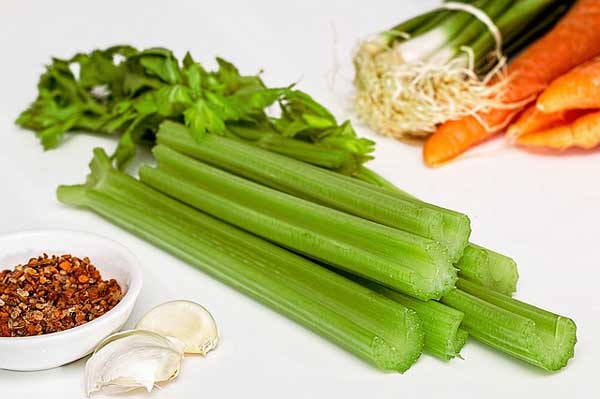
Organic celery, or completely and thoroughly cleaned celery, is the best way to avoid contamination. Vegetables that aren’t organic may be coated with toxins that are harmful to birds. When it comes to celery, which doesn’t need to be peeled, washing is the best way to remove most of them.
So that your cockatiel can easily pick up and consume the celery, chop it up into little pieces. After removing any extra stringy parts, it’s prepared to be fed.
Can You Feed Celery To Baby Cockatiels?
Yes, you can feed celery to baby cockatiels but not in chopped pieces. Like other baby birds, baby cockatiels also need soft and moistened meals. So, in that stage, you can feed them celery in the form of juice. That is because celery is hard, fibrous veggie for them. But celery juice is easily drinkable for them.
To make the celery juice-
- Remove the leaves and stringy fiber from the stalk.
- Cut into small pieces.
- Blend them for 2-3 minutes.
- Once it becomes liquid, strain it.
Now celery juice is ready to feed your cockatiels. Don’t compare a little cockatiel with a budgie. Budgie can eat celery by itself. You don’t need to slice them into pieces. For more clarity, check the video linked below.
FAQs
Chocolate, alcohol, and avocado should never be fed to cockatiels. They might kill birds. Cabbage, caffeine, cream, eggplant, milk, rhubarb, and raw potato, are all on the “no” list.
Yes, celery is safe for birds. It is because celery has just around 14 calories per cup when diced up. You won’t find a lot of fat, fiber, protein, sugar, or salt in it. Moreover, it is an excellent source of anti-inflammatory antioxidants, which aid in the maintenance of a healthy immune system for a bird.
Conclusion
Celery is OK for cockatiels. They can eat it as an occasional organic snack food. Moreover, for birds’ health and good digestion, serve it after cleaning and chopping it into small pieces. Wish your cockatiel good health!
Do you know if your cockatiels can eat crackers or onions? Read our articles about it to learn more.
